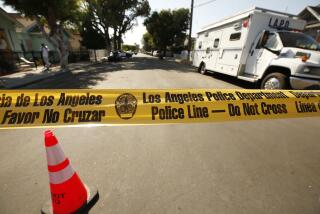Terrorists’ Use of Hazardous Materials Seen
- Share via
WASHINGTON — Law enforcement officials, identifying a new weapon that they fear terrorists could deploy, have charged about 20 people nationwide with fraudulently obtaining hazardous-material licenses, and they have begun scouring terrorist “watch lists” to hunt for others.
Several of the people who obtained or tried to obtain the hazardous-material licenses “may have links to the hijackers” who crashed four planes on Sept. 11, Atty. Gen. John Ashcroft told the Senate Judiciary Committee on Tuesday.
“Terrorism,” Ashcroft said, “is a clear and present danger to Americans today.”
A hazardous-material license, or “endorsement” as it is known, allows a commercial driver who has passed a written test to haul large amounts of gasoline, diesel fuel, chemicals, explosives and other substances that can be dangerous or flammable.
Authorities became concerned about the threat after discovering that a suspect in the Sept. 11 attack investigation, who was arrested near Chicago last week as a material witness, had obtained a commercial license from the state of Michigan last year allowing him to haul hazardous materials on 18-wheelers.
Justice Department officials refused to release any additional information on the suspects, saying that court documents in the cases had been sealed by court orders.
FBI field offices around the country began searching hazardous-material licensing data from state motor vehicle records on Tuesday and matching it against a list of nearly 400 people who authorities believe may have information on the case. Agents were instructed to follow up on anyone who showed up on both lists.
Investigators are seeking to determine whether the hijackers or people associated with them may have hatched a scheme to hijack trucks hauling hazardous chemicals, according to a law enforcement official who asked not to be identified.
“Do we have any specific information that a plot was planned? Is there any specific or credible evidence that individuals were trying to do A, B or C? That’s what we’re trying to nail down. We’re not there yet; it’s something we have a lot of interest in,” the official said.
The hazardous-material issue is only the latest lead that authorities are pursuing in an effort to track down the types of weapons of mass destruction that terrorists might employ.
Already, the FBI has chased down tips and put out warnings about crop-dusters, flight training schools, firetrucks and bogus airline work credentials. In the case of the crop-dusters, federal authorities grounded the agricultural planes for two days because of evidence that some of the hijackers were reported to have shown unusual interest in them. Another suspect in custody had also downloaded extensive material about crop-dusters from the Internet, authorities said.
Federal officials have not imposed any bans or severe restrictions on hazardous-material haulers--an industry that moves an estimated 3 billion tons of material each year and is considered vital to many areas of the U.S. economy.
But in recent days, the FBI has told local police to be on the lookout for suspicious activity involving hazardous-waste haulers; Food and Drug Administration officials have met with a major trucking association to brainstorm ideas for improved security; and the Department of Transportation has asked haulers to take extra safety precautions.
Transportation Secretary Norman Y. Mineta asked haulers to keep hazardous-material shipments away from populated areas if possible, but many haulers noted the need to deliver fuel and other cargo to urban centers.
In the brainstorming sessions between industry groups and the FDA, federal officials gave no indication that they had come across a specific plot to use hazardous materials in an attack, said participant John Conley, vice president of the National Tank Truck Carriers Inc. in Virginia. The discussion, he said, “was really just looking at where the holes might be.”
Conley said traditionally, security measures in the industry have focused much more on keeping hazardous materials inside the trucks, rather than keeping terrorists out.
“In terms of terrorism, it’s not something we’ve really talked about much at our meetings. It just hasn’t been a big concern,” Conley said in an interview.
Longtime Transportation Department official Alan Roberts, now president of the Hazardous Materials Advisory Council, a nonprofit industry association, said that with 1.2 million shipments of hazardous materials in transit in this country on any given day, haulers will have to look for ways to tighten security in the wake of the Sept. 11 attacks.
“The potential threat is there, we can’t deny that,” he said. “If someone wants to do bad things, we have to be more vigilant about watching our equipment and protecting people.”
Ashcroft, in his testimony on Tuesday, said the FBI has advised all law enforcement agencies to be on alert to the hazardous-material threat, and he urged the public to notify the FBI about any suspicious circumstances involving hazardous materials, crop-dusting aircraft “or any other possible terrorist threat.”
Ashcroft said Monday that the FBI has widened its net in the terrorist investigation and is seeking nearly 400 people who are “at large” and may have information on the case. That is in addition to at least 352 people whom authorities have taken into custody on immigration violations, material witness arrests and other charges. No one has been charged as an accomplice in the attacks.
The FBI has freed one suspect who had fallen under sharp scrutiny--a San Antonio doctor who was arrested Sept. 12 and taken to New York for questioning. Outside his home in San Antonio, Al-Badr Al-Hazmi said Tuesday that he forgives those who suspected him of wrongdoing.
More to Read
Sign up for Essential California
The most important California stories and recommendations in your inbox every morning.
You may occasionally receive promotional content from the Los Angeles Times.













